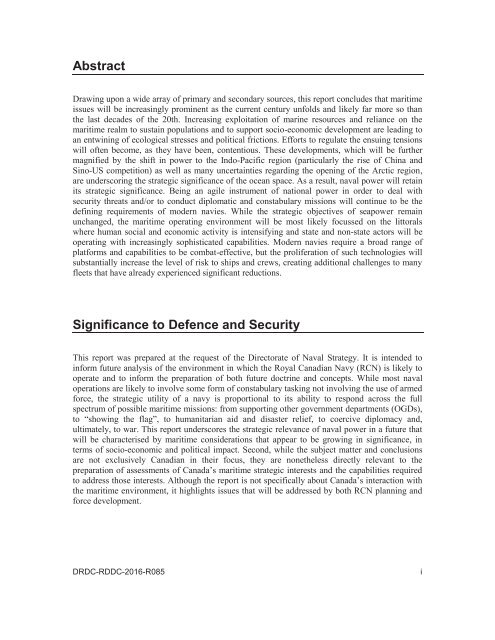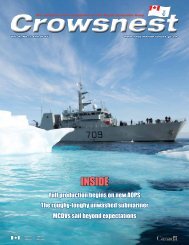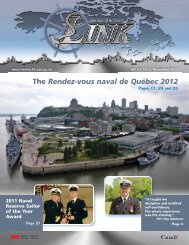Create successful ePaper yourself
Turn your PDF publications into a flip-book with our unique Google optimized e-Paper software.
Abstract …<br />
Drawing upon a wide array <strong>of</strong> primary <strong>and</strong> secondary sources, this report concludes that maritime<br />
issues will be increasingly prominent as <strong>the</strong> current century unfolds <strong>and</strong> likely far more so than<br />
<strong>the</strong> last decades <strong>of</strong> <strong>the</strong> 20th. Increasing exploitation <strong>of</strong> marine resources <strong>and</strong> reliance on <strong>the</strong><br />
maritime realm to sustain populations <strong>and</strong> to support socio-economic development are leading to<br />
an entwining <strong>of</strong> ecological stresses <strong>and</strong> political frictions. Efforts to regulate <strong>the</strong> ensuing tensions<br />
will <strong>of</strong>ten become, as <strong>the</strong>y have been, contentious. <strong>The</strong>se developments, which will be fur<strong>the</strong>r<br />
magnified by <strong>the</strong> shift in power to <strong>the</strong> Indo-Pacific region (particularly <strong>the</strong> rise <strong>of</strong> China <strong>and</strong><br />
Sino-US competition) as well as many uncertainties regarding <strong>the</strong> opening <strong>of</strong> <strong>the</strong> Arctic region,<br />
are underscoring <strong>the</strong> strategic significance <strong>of</strong> <strong>the</strong> ocean space. As a result, naval power will retain<br />
its strategic significance. Being an agile instrument <strong>of</strong> national power in order to deal with<br />
security threats <strong>and</strong>/or to conduct diplomatic <strong>and</strong> constabulary missions will continue to be <strong>the</strong><br />
defining requirements <strong>of</strong> modern navies. While <strong>the</strong> strategic objectives <strong>of</strong> seapower remain<br />
unchanged, <strong>the</strong> maritime operating environment will be most likely focussed on <strong>the</strong> littorals<br />
where human social <strong>and</strong> economic activity is intensifying <strong>and</strong> state <strong>and</strong> non-state actors will be<br />
operating with increasingly sophisticated capabilities. Modern navies require a broad range <strong>of</strong><br />
platforms <strong>and</strong> capabilities to be combat-effective, but <strong>the</strong> proliferation <strong>of</strong> such technologies will<br />
substantially increase <strong>the</strong> level <strong>of</strong> risk to ships <strong>and</strong> crews, creating additional challenges to many<br />
fleets that have already experienced significant reductions.<br />
Significance to Defence <strong>and</strong> Security<br />
This report was prepared at <strong>the</strong> request <strong>of</strong> <strong>the</strong> Directorate <strong>of</strong> <strong>Naval</strong> Strategy. It is intended to<br />
inform future analysis <strong>of</strong> <strong>the</strong> environment in which <strong>the</strong> Royal Canadian Navy (RCN) is likely to<br />
operate <strong>and</strong> to inform <strong>the</strong> preparation <strong>of</strong> both future doctrine <strong>and</strong> concepts. While most naval<br />
operations are likely to involve some form <strong>of</strong> constabulary tasking not involving <strong>the</strong> use <strong>of</strong> armed<br />
force, <strong>the</strong> strategic utility <strong>of</strong> a navy is proportional to its ability to respond across <strong>the</strong> full<br />
spectrum <strong>of</strong> possible maritime missions: from supporting o<strong>the</strong>r government departments (OGDs),<br />
to “showing <strong>the</strong> flag”, to humanitarian aid <strong>and</strong> disaster relief, to coercive diplomacy <strong>and</strong>,<br />
ultimately, to war. This report underscores <strong>the</strong> strategic relevance <strong>of</strong> naval power in a future that<br />
will be characterised by maritime considerations that appear to be growing in significance, in<br />
terms <strong>of</strong> socio-economic <strong>and</strong> political impact. Second, while <strong>the</strong> subject matter <strong>and</strong> conclusions<br />
are not exclusively Canadian in <strong>the</strong>ir focus, <strong>the</strong>y are none<strong>the</strong>less directly relevant to <strong>the</strong><br />
preparation <strong>of</strong> assessments <strong>of</strong> Canada’s maritime strategic interests <strong>and</strong> <strong>the</strong> capabilities required<br />
to address those interests. Although <strong>the</strong> report is not specifically about Canada’s interaction with<br />
<strong>the</strong> maritime environment, it highlights issues that will be addressed by both RCN planning <strong>and</strong><br />
force development.<br />
DRDC-RDDC-2016-R085<br />
i




